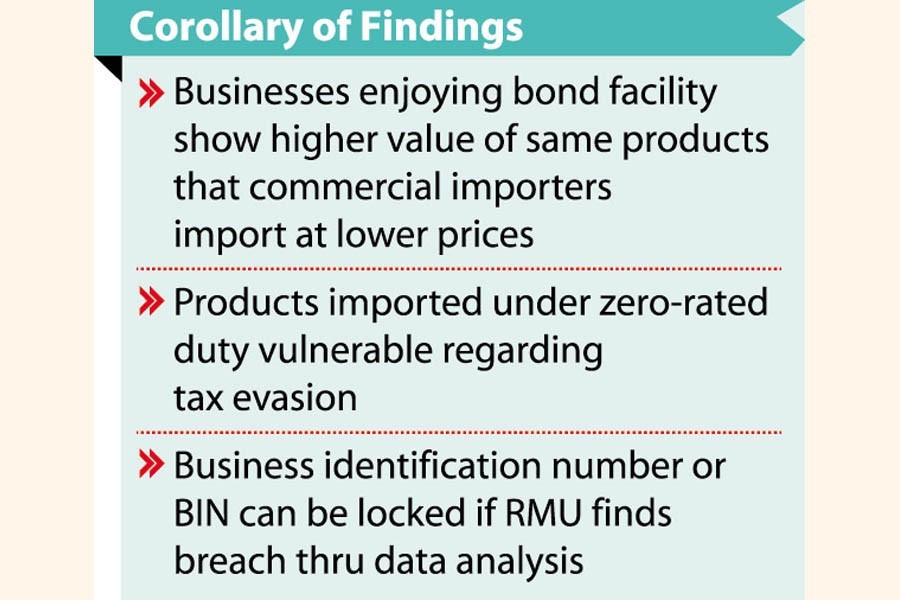A customs wing has detected numerous doubtful dealings in its initial scrutiny of trade-based irregularities, which are said to be linked to siphoning off foreign currencies, officials say.
Trade misinvoicing like over-invoicing of imports and under-invoicing of exports is seen by economists and taxmen as major conduits of capital flight from Bangladesh to the tune of billions.
The newly launched Risk Management Unit of Customs wing of the revenue board has detected a number of such instances of mispricing of merchandise.
Through data analysis, the RMU has found variations in the assessment in customs houses ranging from around US$300 to $ 400 for the same products of same quality, the officials have said.
It has also divulged that some importers showed exorbitant prices in purchasing products from other countries in comparison with their usual prices.
Some doubtful cases made the unit officials concerned as they found prices of same products imported under bonded-warehouse facility and commercial imports having noticeable differences.
"We have found value of a particular product imported through Kamalapur ICD, Chittagong Customs house and Dhaka Customs house different due to variations in assessment," says Kazi Mustafizur Rahman, Commissioner of the RMU.
The unit has already started data analysis manually until it gets funds for software procurement, he adds.
Earlier, the National Board of Revenue (NBR) had issued an order to all customs houses across the country to integrate the value and follow same method of valuation.
Another senior customs official says businesses enjoying bond facility show higher value of the same products that the commercial importers import at lower prices.
"Such practice would be investigated properly as those may be linked to trade-based money laundering through over-invoicing," he adds.
The official also pointed the products imported under zero-rated tax and duty as vulnerable regarding tax evasion.
The NBR formed the risk-management unit to select the risky companies for duty evasion so that customs officials can lock their Business Identification Number (BIN) on the basis of data analysis.
Once the risky companies are listed out, other companies would enjoy hassle-free export-import trade through the customs port, the officials believe.
Former President of Dhaka Chamber of Commerce and Industry (DCCI) Abul Kasem Khan says the National Board of Revenue should recognize the businesses who received award as top and compliant taxpayers as 'trusted trader'.
"Revenue officials will be able to focus on tax-net expansion rather than wasting time on chasing compliant taxpayers," he adds. It would help businesses to operate smoothly without facing hassle.
Under the Customs Act 1969, risk management is necessary for the purpose of identifying and evaluating the risks, and developing the necessary counter-measures.
Customs control mechanisms, including random check, would primarily be done on risk analysis done by using electronic data-processing techniques.
Customs officials would follow the criteria on risk analysis developed at local, national or international levels.
"The Board shall establish a Customs Risk Management Unit for conducting the overall customs risk management including automated risk management. For the purpose of conducting risk management in a coordinated manner with other government agencies managing international passenger traffic and controlling goods, cargo or transport a National Risk Targeting Center shall be created and managed by this Unit," the customs act states.
The law empowered the board to appoint required number of customs officers and staffs and, from time to time, formulate rules and operational procedures for RMU.
The unit also moved to procure software and develop its infrastructure to strengthen its capacity.
According to an initial estimate, the RMU would need Tk 220 million to procure software from local companies and for other preparations.
Earlier in 2012, the NBR formed a Risk Management Central Unit that proved to be a lame duck for not having organogram, full-time officer, logistic supports, legal backup or policy guidelines for carrying out its activities.
According to the customs-modernisation plan of the NBR, the unit was supposed to start its work in September 2013.
The assessment of current risk-management practices was also supposed to be made within September 2013- February 2014, while a presentation of the findings was due in March 2014.
The formulation of policy on documents related to risk management was due in September 2014. Officials said none of the deadlines was met by the previous unit.
The RMU is supposed to identify the risky traders, risky import-export consignments based on various criteria after analysing the recent trends, past records and other data.
Proper activation of the risk-management unit is believed to help Bangladesh align with the revised Kyoto Convention, the Framework of Standards to secure and Facilitate Trade, the World Trade Organisation's Trade Facilitation Agreement and implement customs-modernisation strategic action plan.


